Tia Silverthorne Bach's Blog, page 58
April 20, 2013
Red Herring = R: Blogging from A to Z
Ready for R!
Continuing with my Blogging from A to Z Challenge theme of literary devices, today is red herring.
Red Herring
(source)
An English-language idiom that commonly refers to a logical fallacy that misleads or detracts from the actual issue. It is also a literary device employed by writers that leads readers or characters towards a false conclusion, often used in mystery or detective fiction.
The origin of the expression has a number of theories. Conventional wisdom has long attributed it to a technique of training hounds to follow a scent, or of distracting hounds during a fox hunt; however modern linguistic research suggests that it was most likely a literary device invented in 1807 by English polemicist William Cobbett, and never an actual practice of hunters. The phrase was later borrowed to provide a formal name for the logical fallacy, and is also a formal name for a literary device or technique.
Why, you might ask, is there a picture from the A Pup Named Scooby-Doo series?
As soon as I decided on red herring, Scooby-Doo cartoons popped in my head. First, there was always at least one red herring per episode. Second, there was an actual character named Red Herring in the A Pup Named Scooby-Doo series.
Although it's obviously a tool for mysteries, a lot of paranormal novels play with this concept. Is the vampire/werewolf/angel bad? Or, does one seem good that ends up bad or vice versa? Such a fun tool!
Do you have a favorite example of a red herring?
Please take a moment to visit some other R blogs today here .
Continuing with my Blogging from A to Z Challenge theme of literary devices, today is red herring.
Red Herring
(source)
An English-language idiom that commonly refers to a logical fallacy that misleads or detracts from the actual issue. It is also a literary device employed by writers that leads readers or characters towards a false conclusion, often used in mystery or detective fiction.
The origin of the expression has a number of theories. Conventional wisdom has long attributed it to a technique of training hounds to follow a scent, or of distracting hounds during a fox hunt; however modern linguistic research suggests that it was most likely a literary device invented in 1807 by English polemicist William Cobbett, and never an actual practice of hunters. The phrase was later borrowed to provide a formal name for the logical fallacy, and is also a formal name for a literary device or technique.
Why, you might ask, is there a picture from the A Pup Named Scooby-Doo series?
As soon as I decided on red herring, Scooby-Doo cartoons popped in my head. First, there was always at least one red herring per episode. Second, there was an actual character named Red Herring in the A Pup Named Scooby-Doo series.
Although it's obviously a tool for mysteries, a lot of paranormal novels play with this concept. Is the vampire/werewolf/angel bad? Or, does one seem good that ends up bad or vice versa? Such a fun tool!
Do you have a favorite example of a red herring?
Please take a moment to visit some other R blogs today here .
Published on April 20, 2013 04:00
April 19, 2013
Quibble Questions = Q: Blogging from A to Z
The dreaded Q. Blogging from A to Z in one month is enough of a challenge without the pesky Q and Z to figure out.
As someone who loved Grisham's books before he was popular, I appreciate a great legal thriller. Which leads me to the literary device of the day.
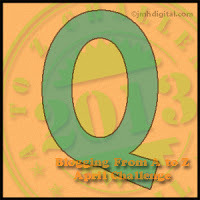 Quibble
Quibble
(Source)
v. 1. To evade the truth or importance of an issue by raising trivial distinctions and objections.
2. To find fault or criticize for petty reasons; cavil.n. 1. A petty distinction or an irrelevant objection.
In literature, this plot device allows a character to manipulate the outcome by using the literal interpretation of an agreement instead of its intended meaning.
According to Wikipedia, "one of the best known examples, William Shakespeare used a quibble in The Merchant of Venice. Portia saves Antonio in a court of law by pointing out that the agreement called for a pound of flesh, but no blood, and therefore Shylock can collect only if he sheds no blood."
Although most commonly used with legal agreements, it can be used for magically enforced agreements.
How many times does the genie gain the upper hand by literally interpreting a wish?
All the parents out there can appreciate. Time after time, my teenager "evades the truth... by raising trivial distinctions and objections." Of course, I can't think of one example right now. *figures*
Stop by and enjoy some other Q posts here .
As someone who loved Grisham's books before he was popular, I appreciate a great legal thriller. Which leads me to the literary device of the day.
 Quibble
Quibble(Source)
v. 1. To evade the truth or importance of an issue by raising trivial distinctions and objections.
2. To find fault or criticize for petty reasons; cavil.n. 1. A petty distinction or an irrelevant objection.
In literature, this plot device allows a character to manipulate the outcome by using the literal interpretation of an agreement instead of its intended meaning.
According to Wikipedia, "one of the best known examples, William Shakespeare used a quibble in The Merchant of Venice. Portia saves Antonio in a court of law by pointing out that the agreement called for a pound of flesh, but no blood, and therefore Shylock can collect only if he sheds no blood."
Although most commonly used with legal agreements, it can be used for magically enforced agreements.
How many times does the genie gain the upper hand by literally interpreting a wish?
All the parents out there can appreciate. Time after time, my teenager "evades the truth... by raising trivial distinctions and objections." Of course, I can't think of one example right now. *figures*
Stop by and enjoy some other Q posts here .
Published on April 19, 2013 04:00
April 18, 2013
Plot Twists = P: Blogging from A to Z
P presented many possible literary devices: protagonist, pathos, parody, paradox, persona, point of view, personification. Pressure!
Writing is a complicated, and exhilarating, process. Few devices showcase that like a good plot twist. Especially a jaw-hits-the-floor plot twist.
** spoiler alert **
If you've seen these words, you know the respect most reviewers and journalists have for an amazing plot twist. Usually, they will be as vague as possible to avoid ruining the surprise. When it's necessary to expose the twist, most will include the spoiler warning to honor those readers who don't want to know.
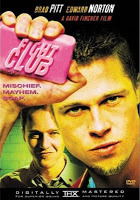 Of all the plot twists I've experienced, none left me as flabbergasted as The Fight Club. Never. Saw. It. Coming. It's one of those great movies where you want to immediately watch it again and figure out how you missed it.
Of all the plot twists I've experienced, none left me as flabbergasted as The Fight Club. Never. Saw. It. Coming. It's one of those great movies where you want to immediately watch it again and figure out how you missed it.
Sure, I was distracted by Brad Pitt's body, but it was more than that. With such an intense and mesmerizing story, I never suspected the ending. That's great storytelling.
The same could be said for The Usual Suspects, one of my favorite movies as listed here . When Kevin Spacey's character walks away at the end, his limp suddenly disappearing, I had chills.
But there's a pitfall with plot twists. You have to sell an amazing story first. Twists for the sake of twists rarely work. There's a huge difference between a reader's jaw dropping and a reader shaking their head.
What's your favorite plot twist in a book or movie? Spoiler alerts encouraged. Just this once. *smiles*
Please visit other P posts here.
Writing is a complicated, and exhilarating, process. Few devices showcase that like a good plot twist. Especially a jaw-hits-the-floor plot twist.
** spoiler alert **
If you've seen these words, you know the respect most reviewers and journalists have for an amazing plot twist. Usually, they will be as vague as possible to avoid ruining the surprise. When it's necessary to expose the twist, most will include the spoiler warning to honor those readers who don't want to know.
 Of all the plot twists I've experienced, none left me as flabbergasted as The Fight Club. Never. Saw. It. Coming. It's one of those great movies where you want to immediately watch it again and figure out how you missed it.
Of all the plot twists I've experienced, none left me as flabbergasted as The Fight Club. Never. Saw. It. Coming. It's one of those great movies where you want to immediately watch it again and figure out how you missed it. Sure, I was distracted by Brad Pitt's body, but it was more than that. With such an intense and mesmerizing story, I never suspected the ending. That's great storytelling.
The same could be said for The Usual Suspects, one of my favorite movies as listed here . When Kevin Spacey's character walks away at the end, his limp suddenly disappearing, I had chills.
But there's a pitfall with plot twists. You have to sell an amazing story first. Twists for the sake of twists rarely work. There's a huge difference between a reader's jaw dropping and a reader shaking their head.
What's your favorite plot twist in a book or movie? Spoiler alerts encouraged. Just this once. *smiles*
Please visit other P posts here.
Published on April 18, 2013 04:00
April 17, 2013
Oxymoron = O: Blogging from A to Z Challenge
Wow, we've made it to the big O. Wait, that didn't come out exactly as I had planned. *winks*
Last year, I wrote about Onomatopoeia . Such a rhythmic sound. I always imagine it as a Julie Andrew's song. But, in the interest of covering new territory, this year I decided to go with Oxymoron.
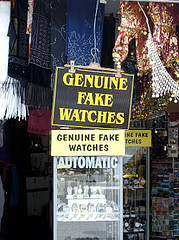 Source - Creative Commons
Source - Creative Commons
Oxymoron
(Merriam-Webster)
A combination of contradictory or incongruous words (as cruel kindness); broadly : something (as a concept) that is made up of contradictory or incongruous elements.
I love a good oxymoron! Earlier this month, I discussed Juxtaposition for J . Juxtaposition in a lot of ways is an extended oxymoron, since it lasts longer than a brief phrase. But there's something deceptively honest about a good contradictory phrase.
I'm from the South, and there are many examples of oxymoron that we Southern gals use on a daily basis. My favorites:
awfully gooda fine messdead rightclearly misunderstoodpretty uglyseriously funnyholy hellnothing muchOnes I never really considered before researching this, but are obvious to me now:
Civil Wardrawing a blankmutual differencesnecessary evilWhat is your favorite oxymoron?
Please visit other O posts in the Blogging from A to Z Challenge participant list .
Last year, I wrote about Onomatopoeia . Such a rhythmic sound. I always imagine it as a Julie Andrew's song. But, in the interest of covering new territory, this year I decided to go with Oxymoron.
 Source - Creative Commons
Source - Creative CommonsOxymoron
(Merriam-Webster)
A combination of contradictory or incongruous words (as cruel kindness); broadly : something (as a concept) that is made up of contradictory or incongruous elements.
I love a good oxymoron! Earlier this month, I discussed Juxtaposition for J . Juxtaposition in a lot of ways is an extended oxymoron, since it lasts longer than a brief phrase. But there's something deceptively honest about a good contradictory phrase.
I'm from the South, and there are many examples of oxymoron that we Southern gals use on a daily basis. My favorites:
awfully gooda fine messdead rightclearly misunderstoodpretty uglyseriously funnyholy hellnothing muchOnes I never really considered before researching this, but are obvious to me now:
Civil Wardrawing a blankmutual differencesnecessary evilWhat is your favorite oxymoron?
Please visit other O posts in the Blogging from A to Z Challenge participant list .
Published on April 17, 2013 04:00
April 16, 2013
Noteworthy Narrators = N: Blogging from A to Z
Have you ever noticed that most of the N adjectives are negative? I didn't until I searched N adjectives for some help today. (Nutty, noxious, noisy, naughty, nasty, nasal. Eek!)
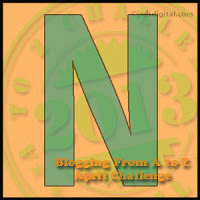 Then I happened upon noteworthy.
Then I happened upon noteworthy.
When writing a story, few things are more noteworthy than narrators.
Narrator is simply the voice that tells the story. Yet, it's a device that is anything but simple. A story in different hands is a different story. An example that jumps to mind, the gospels in the Bible. Told by Matthew, Mark, Luke and John, they each include different details and present a unique feel even with the same basic storyline.
I have written two books, one in first person and one in third. Although each has its own set of challenges, I found first person allowed me to share more of the main character's internal thoughts and feelings. It also helped me get into the character's head more. However, it was limiting when it came to other characters.
A brief overview of the main types of narrators...
First Person
The "I" narrator who is a participant in the action. Although this is usually the protagonist, it doesn't have to be.
Third Person
The "he/she/it" narrator. There are two main types. Omniscient (all-knowing) can peek into the lives of many characters while limited only knows what the main character, or characters, knows.
Detached Observer
A detached, third person, narrator tells the story without opinion (emotionally detached). This can be a minor character.
The Commentator
This narrator never enters the story but has plenty to say.
Then there is the Unreliable Narrator. Not to spoil the surprise, but this will be my U literary device. Stay tuned!
What makes a good narrator?
Ask ten readers, and you could get ten different answers. For me, I want a narrator I can trust to give me the insight I need to understand the story. Usually, I relate more to a female voice, but one of my favorite narrators was Enzo (the dog) in The Art of Racing in the Rain. Not just because a dog's voice was unique, but because Enzo was at the center of the action and could give an in-depth and honest perspective on what was happening.
Please come back tomorrow for some fun takes on Oxymoron, and don't forget to take a peek at other N posts here .
 Then I happened upon noteworthy.
Then I happened upon noteworthy. When writing a story, few things are more noteworthy than narrators.
Narrator is simply the voice that tells the story. Yet, it's a device that is anything but simple. A story in different hands is a different story. An example that jumps to mind, the gospels in the Bible. Told by Matthew, Mark, Luke and John, they each include different details and present a unique feel even with the same basic storyline.
I have written two books, one in first person and one in third. Although each has its own set of challenges, I found first person allowed me to share more of the main character's internal thoughts and feelings. It also helped me get into the character's head more. However, it was limiting when it came to other characters.
A brief overview of the main types of narrators...
First Person
The "I" narrator who is a participant in the action. Although this is usually the protagonist, it doesn't have to be.
Third Person
The "he/she/it" narrator. There are two main types. Omniscient (all-knowing) can peek into the lives of many characters while limited only knows what the main character, or characters, knows.
Detached Observer
A detached, third person, narrator tells the story without opinion (emotionally detached). This can be a minor character.
The Commentator
This narrator never enters the story but has plenty to say.
Then there is the Unreliable Narrator. Not to spoil the surprise, but this will be my U literary device. Stay tuned!
What makes a good narrator?
Ask ten readers, and you could get ten different answers. For me, I want a narrator I can trust to give me the insight I need to understand the story. Usually, I relate more to a female voice, but one of my favorite narrators was Enzo (the dog) in The Art of Racing in the Rain. Not just because a dog's voice was unique, but because Enzo was at the center of the action and could give an in-depth and honest perspective on what was happening.
Please come back tomorrow for some fun takes on Oxymoron, and don't forget to take a peek at other N posts here .
Published on April 16, 2013 06:01
April 15, 2013
Metonymy = M: Blogging from A to Z
M is making me maniacal. So many great literary devices to choose from: metaphor, motif, myth, melodrama, monologue, mood. Not to mention an important m word that many authors credit with their final works... muse.
Last year, one of my most popular A to Z posts was M: Mauling Malapropism . Malapropism is the absurd or humorous misuse of a word, especially by confusion with one of similar sound. The master is Yogi Berra.
 Words, and the ability to manipulate them, fascinate me.
Words, and the ability to manipulate them, fascinate me.
So, I decided this year to focus on metonymy.
Metonymy
(source)
When the name of one object replaces another object that is closely associated with it. It comes from the Greek word metōnymía, meaning “change of name.”
As writers, we understand and believe that "the pen is mightier than the sword." Does this mean we would head into war with a bunch of ball point pens? Absolutely not. However, many of us believe that the power of the written word is greater than pulling out a sword and fighting.
Consider the word heart. In its purest definition, it is a vital organ. However, as writers we give characters heart by infusing them with tenderness, love, and empathy.
The English language is beautifully complicated. When words are in the right hands, it's amazing how they can be manipulated to convey so many things.
Other examples:
Silver fox - an attractive older man
Cougar - an aggressive woman who prefers younger men
White House - when reporters refer to "decisions made by the White House"
Ears - "lend me your ears"
It seems to me it would be an interesting showdown between a silver fox and a cougar under the circumstances above. In real terms, a cougar would win hands down.
What is your favorite example of metonymy?
Don't forget to check out some other amazing M posts here .
Last year, one of my most popular A to Z posts was M: Mauling Malapropism . Malapropism is the absurd or humorous misuse of a word, especially by confusion with one of similar sound. The master is Yogi Berra.
 Words, and the ability to manipulate them, fascinate me.
Words, and the ability to manipulate them, fascinate me.So, I decided this year to focus on metonymy.
Metonymy
(source)
When the name of one object replaces another object that is closely associated with it. It comes from the Greek word metōnymía, meaning “change of name.”
As writers, we understand and believe that "the pen is mightier than the sword." Does this mean we would head into war with a bunch of ball point pens? Absolutely not. However, many of us believe that the power of the written word is greater than pulling out a sword and fighting.
Consider the word heart. In its purest definition, it is a vital organ. However, as writers we give characters heart by infusing them with tenderness, love, and empathy.
The English language is beautifully complicated. When words are in the right hands, it's amazing how they can be manipulated to convey so many things.
Other examples:
Silver fox - an attractive older man
Cougar - an aggressive woman who prefers younger men
White House - when reporters refer to "decisions made by the White House"
Ears - "lend me your ears"
It seems to me it would be an interesting showdown between a silver fox and a cougar under the circumstances above. In real terms, a cougar would win hands down.
What is your favorite example of metonymy?
Don't forget to check out some other amazing M posts here .
Published on April 15, 2013 04:00
April 14, 2013
Should Authors Worry About Trends? = ROW80 Update
Keeping it short and sweet today.
Although I'm loving the Blogging from A to Z Challenge this year, the posts and social media commitment have taken a lot out of me. Oh, and did I mention I'm knee-deep in getting my second book ready?
My second book, a YA paranormal, is coming along nicely. I'm quite proud of it, especially since I wasn't so sure I had a second book in me. I hoped, but I wasn't sure.

But now I'm starting to worry... is YA paranormal heading the way of leg warmers and heavily-hairsprayed hair? Did I miss a boat that has now sailed?
I did not set out to write a paranormal book. Instead, I wanted to write a book about a young adult struggling with changes in her life after a devastating event. My muse took it paranormal.
Now, I'm prepping to publish a book into a very crowded and competitive marketplace. Maybe because I read so many genres, never lingering too long on any particular one, but I never have issues with genre-burnout. I wonder if other readers feel the same. Or, do they read whatever is hot and then move onto the next hot thing?
Do trends matter? Should an author consider what is hot when they write?
My A Round of Words in 80 Days (ROW80) Update...
Busy, busy, busy.
I'm neck-deep in preparations for a cross-country move. The sign is in the yard, although I'm surprised it's still standing since my daughter took a bat to it. But, I'm determined to get Chasing Memories out in the midst of craziness.
Publish Chasing Memories -- Edit #3 is done and back in the hands of my Editor, the lovely Jo Michaels. Cover is done! My daughter squealed when she saw it. Really squealed.Survive the A to Z Blog Challenge -- Only done through O, so I plan to get through at least Q tomorrow.Map out the sequel to Chasing Memories - Excited to work more on this. The ideas are coming at me fast and furious.Make significant progress on the follow-up to Depression Cookies - DCII is on hold right now for many reasons. I am not ready to walk away from this character, but my life is overflowing.Hope all my ROW80 buddies are rocking their goals!
Although I'm loving the Blogging from A to Z Challenge this year, the posts and social media commitment have taken a lot out of me. Oh, and did I mention I'm knee-deep in getting my second book ready?
My second book, a YA paranormal, is coming along nicely. I'm quite proud of it, especially since I wasn't so sure I had a second book in me. I hoped, but I wasn't sure.

But now I'm starting to worry... is YA paranormal heading the way of leg warmers and heavily-hairsprayed hair? Did I miss a boat that has now sailed?
I did not set out to write a paranormal book. Instead, I wanted to write a book about a young adult struggling with changes in her life after a devastating event. My muse took it paranormal.
Now, I'm prepping to publish a book into a very crowded and competitive marketplace. Maybe because I read so many genres, never lingering too long on any particular one, but I never have issues with genre-burnout. I wonder if other readers feel the same. Or, do they read whatever is hot and then move onto the next hot thing?
Do trends matter? Should an author consider what is hot when they write?
My A Round of Words in 80 Days (ROW80) Update...
Busy, busy, busy.
I'm neck-deep in preparations for a cross-country move. The sign is in the yard, although I'm surprised it's still standing since my daughter took a bat to it. But, I'm determined to get Chasing Memories out in the midst of craziness.
Publish Chasing Memories -- Edit #3 is done and back in the hands of my Editor, the lovely Jo Michaels. Cover is done! My daughter squealed when she saw it. Really squealed.Survive the A to Z Blog Challenge -- Only done through O, so I plan to get through at least Q tomorrow.Map out the sequel to Chasing Memories - Excited to work more on this. The ideas are coming at me fast and furious.Make significant progress on the follow-up to Depression Cookies - DCII is on hold right now for many reasons. I am not ready to walk away from this character, but my life is overflowing.Hope all my ROW80 buddies are rocking their goals!
Published on April 14, 2013 05:00
April 13, 2013
Leit-Motif = L: Blogging from A to Z
This post is brought to you by the letter L.
If you grew up loving Sesame Street or have a kid who watches it quite often, you know where that introduction comes from. Also, it shows you how a recurring device sticks with you.
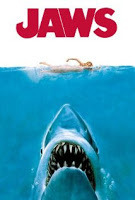
(Source)
(also spelled leitmotiv): From the German term for "lead motif," a leit-motif originally was coined by Hans von Wolzuegen to designate a musical theme associated with a particular object, character, or emotion. For instance, the ominous music in Jaws plays whenever the shark is approaching. That particular score is the leit-motif for the shark. In literature, critics have adapted the term leit-motif to refer to an object, animal, phrase, or other thing loosely associated with a character, a setting, or event. The leit-motif is not necessarily a symbol (though it can be). Rather, it is a recurring device loosely linked with a character, setting, or event. It gives the audience a "heads-up" by calling attention to itself and suggesting that its appearance is somehow connected with its appearance in other parts of the narrative.
Actually, my husband came up with two great examples for this one: I am Legend by Richard Matheson and Travels with Charley by John Steinbeck. Both feature men traveling their life journey with a dog, a companion used to show the reader more about the characters.
So many wonderful reads use a recurring object or character phrase to build a story and engaging the reader. Think Bond and his shaken-not-stirred martini or Bugs Bunny's "What's Up, Doc?".
For fun, I thought we could play a little game. The following are repetitive phrases associated with a character:
1. Elementary, my dear...
2. Old sport
3. Bah, Humbug
Do you know who these characters are? Feel free to play along in the comments.
Please visit other L posts here. Wishing everyone a lovely Saturday!
If you grew up loving Sesame Street or have a kid who watches it quite often, you know where that introduction comes from. Also, it shows you how a recurring device sticks with you.

(Source)
(also spelled leitmotiv): From the German term for "lead motif," a leit-motif originally was coined by Hans von Wolzuegen to designate a musical theme associated with a particular object, character, or emotion. For instance, the ominous music in Jaws plays whenever the shark is approaching. That particular score is the leit-motif for the shark. In literature, critics have adapted the term leit-motif to refer to an object, animal, phrase, or other thing loosely associated with a character, a setting, or event. The leit-motif is not necessarily a symbol (though it can be). Rather, it is a recurring device loosely linked with a character, setting, or event. It gives the audience a "heads-up" by calling attention to itself and suggesting that its appearance is somehow connected with its appearance in other parts of the narrative.
Actually, my husband came up with two great examples for this one: I am Legend by Richard Matheson and Travels with Charley by John Steinbeck. Both feature men traveling their life journey with a dog, a companion used to show the reader more about the characters.
So many wonderful reads use a recurring object or character phrase to build a story and engaging the reader. Think Bond and his shaken-not-stirred martini or Bugs Bunny's "What's Up, Doc?".
For fun, I thought we could play a little game. The following are repetitive phrases associated with a character:
1. Elementary, my dear...
2. Old sport
3. Bah, Humbug
Do you know who these characters are? Feel free to play along in the comments.
Please visit other L posts here. Wishing everyone a lovely Saturday!
Published on April 13, 2013 04:00
April 12, 2013
Kleos (& Gerard Butler's 300 Abs) = K: Blogging from A to Z
K is always a toughie, so I'm excited to visit other K posts today. If K equally intrigues you, please visit the
Blogging from A to Z participant list
for some great takes on K.
A literary device that begins with K... hmmm. As hard as I tried, I couldn't come up with anything, so I hit the Internet. I found a few (some were pushing it... like alternate spellings for c words) but decided on...
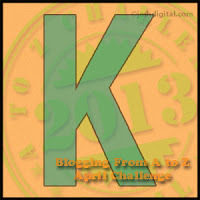 Kleos
Kleos
(Source)
(Greek, "What others hear about you"): Renown, honor, glory, and fair reputation achieved through great deeds--especially battle but to a lesser extent in Olympic games, poetry contests, and literature. The Greeks thought of kleos as something transferred from a father to a son, and the son would inherit the duty for carrying on and building upon the "glory" of the father. In Greek literature, kleos becomes a predominant concern of epic heroes like Achilles, who must choose between achieving kleos but dying in battle, or having a long and happy life but having his name fade after a few generations.
When I looked this up, the definition redirected me to see fame/shame culture. According to this site , fame/shame culture is the anthropological term for a culture in which masculine behavior revolves around a code of martial honor. These cultures embody the idea of death before dishonor. Such civilizations often glorify military prowess and romanticize death in battle. Typically, such a society rewards men who display bravery by (a) engaging in risk-taking behavior to enhance one's reputation, (b) facing certain death in preference to accusations of cowardice, and (c) displaying loyalty to one's king, chieftain, liege lord, or other authoritative figure in the face of adversity.
Of course, I thought about 300. Then I thought about Gerard Butler's abs and got distracted for quite a while.
But, back to kleos. I found this concept interesting. Is there a modern form of this? Even those in the military, although willing to die for what they believe in, don't often get the respect and "fame" associated with laying their lives on the line.
So, other than authors writing historical fiction or about some Middle East cultures, this literary device is beginning to die a cultural death. Right?
A possible exception... those stories that bring Greek culture to the modern world. Think The Lightning Thief. Or, interpreted loosely, any story about a son feeling pressured by his father's legacy (since the term is male-based). Consider Prince William, a man destined to be King... he has to live up more to his female ancestors (the Queen and his mother) than any man (Prince Charles. Um, no).
Oh, and since I mentioned it, I thought it only polite to share Gerard Butler's abs. I figured it was best to save for the end so my female readers wouldn't be too distracted. Enjoy!
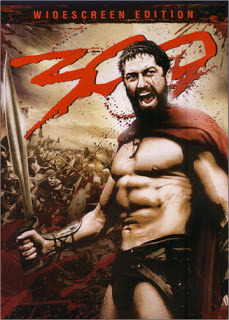
A literary device that begins with K... hmmm. As hard as I tried, I couldn't come up with anything, so I hit the Internet. I found a few (some were pushing it... like alternate spellings for c words) but decided on...
 Kleos
Kleos
(Source)
(Greek, "What others hear about you"): Renown, honor, glory, and fair reputation achieved through great deeds--especially battle but to a lesser extent in Olympic games, poetry contests, and literature. The Greeks thought of kleos as something transferred from a father to a son, and the son would inherit the duty for carrying on and building upon the "glory" of the father. In Greek literature, kleos becomes a predominant concern of epic heroes like Achilles, who must choose between achieving kleos but dying in battle, or having a long and happy life but having his name fade after a few generations.
When I looked this up, the definition redirected me to see fame/shame culture. According to this site , fame/shame culture is the anthropological term for a culture in which masculine behavior revolves around a code of martial honor. These cultures embody the idea of death before dishonor. Such civilizations often glorify military prowess and romanticize death in battle. Typically, such a society rewards men who display bravery by (a) engaging in risk-taking behavior to enhance one's reputation, (b) facing certain death in preference to accusations of cowardice, and (c) displaying loyalty to one's king, chieftain, liege lord, or other authoritative figure in the face of adversity.
Of course, I thought about 300. Then I thought about Gerard Butler's abs and got distracted for quite a while.
But, back to kleos. I found this concept interesting. Is there a modern form of this? Even those in the military, although willing to die for what they believe in, don't often get the respect and "fame" associated with laying their lives on the line.
So, other than authors writing historical fiction or about some Middle East cultures, this literary device is beginning to die a cultural death. Right?
A possible exception... those stories that bring Greek culture to the modern world. Think The Lightning Thief. Or, interpreted loosely, any story about a son feeling pressured by his father's legacy (since the term is male-based). Consider Prince William, a man destined to be King... he has to live up more to his female ancestors (the Queen and his mother) than any man (Prince Charles. Um, no).
Oh, and since I mentioned it, I thought it only polite to share Gerard Butler's abs. I figured it was best to save for the end so my female readers wouldn't be too distracted. Enjoy!

Published on April 12, 2013 04:00
April 11, 2013
The Jack & Jill of Juxtaposition = J: Blogging from A to Z
And then there were 16.
Welcome to Day J of the Blogging from A to Z Challenge.
Continuing with my theme of literary devices, today we are talking about juxtaposition.
 SourceJuxtaposition(source)Juxtaposition refers to the use of dissimilar terms, concepts, or images in order to contrast their varying (or opposite) attributes. This may be used for ironic effect, to create surprise or humor, or to stimulate the imagination.
SourceJuxtaposition(source)Juxtaposition refers to the use of dissimilar terms, concepts, or images in order to contrast their varying (or opposite) attributes. This may be used for ironic effect, to create surprise or humor, or to stimulate the imagination.
Juxtaposition is often used for comparison and contrast, rhetorical effect, suspense, and character development. For characters, it's often the yen and yang of personalities.
For example:
Consider The Prince and the Pauper. The author took two young men from very different worlds, who happened to look just alike, and had them change positions--a prince to a pauper and vice versa. By placing each of them in the other's life, the author was able to compare and contrast how they saw the world. Through this literary device, the reader was privy to a deeper understanding of both characters.
For moms of girls, a newer example would be Barbie's The Princess and the Pauper. *winks*
Another example is the picture featured above. The advertisement for God right along an ad to "Stop Sleeping Around." In Kentucky, where I went to college, you could often find billboard ads for strip clubs near ads for a church or Right to Life billboard. Even though I've seen such a scenario many times, it always gives me pause.
By placing two seemingly different items together, it not only points out their differences but strengthens what each stands for--good or bad.
What's your favorite example of juxtaposition?
As a mom, I see my daughters as a day-to-day example of juxtaposition. They are each a combination of the same two parents' DNA, and they are being brought up with similar values and financial security, yet they are all so different. Their personalities glow, mainly as compared to each other.
And, as the title of this post implies, the nursery rhyme Jack & Jill shows how each handles going down the hill.
Jack and Jill went up the hillTo fetch a pail of water.Jack fell down and broke his crown,And Jill came tumbling after.
Welcome to Day J of the Blogging from A to Z Challenge.
Continuing with my theme of literary devices, today we are talking about juxtaposition.
 SourceJuxtaposition(source)Juxtaposition refers to the use of dissimilar terms, concepts, or images in order to contrast their varying (or opposite) attributes. This may be used for ironic effect, to create surprise or humor, or to stimulate the imagination.
SourceJuxtaposition(source)Juxtaposition refers to the use of dissimilar terms, concepts, or images in order to contrast their varying (or opposite) attributes. This may be used for ironic effect, to create surprise or humor, or to stimulate the imagination.Juxtaposition is often used for comparison and contrast, rhetorical effect, suspense, and character development. For characters, it's often the yen and yang of personalities.
For example:
Consider The Prince and the Pauper. The author took two young men from very different worlds, who happened to look just alike, and had them change positions--a prince to a pauper and vice versa. By placing each of them in the other's life, the author was able to compare and contrast how they saw the world. Through this literary device, the reader was privy to a deeper understanding of both characters.
For moms of girls, a newer example would be Barbie's The Princess and the Pauper. *winks*
Another example is the picture featured above. The advertisement for God right along an ad to "Stop Sleeping Around." In Kentucky, where I went to college, you could often find billboard ads for strip clubs near ads for a church or Right to Life billboard. Even though I've seen such a scenario many times, it always gives me pause.
By placing two seemingly different items together, it not only points out their differences but strengthens what each stands for--good or bad.
What's your favorite example of juxtaposition?
As a mom, I see my daughters as a day-to-day example of juxtaposition. They are each a combination of the same two parents' DNA, and they are being brought up with similar values and financial security, yet they are all so different. Their personalities glow, mainly as compared to each other.
And, as the title of this post implies, the nursery rhyme Jack & Jill shows how each handles going down the hill.
Jack and Jill went up the hillTo fetch a pail of water.Jack fell down and broke his crown,And Jill came tumbling after.
Published on April 11, 2013 04:00



